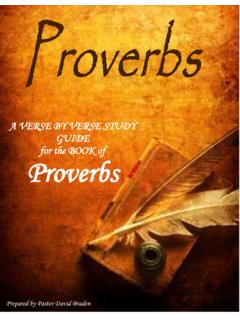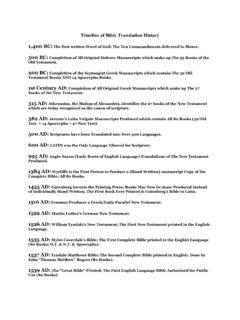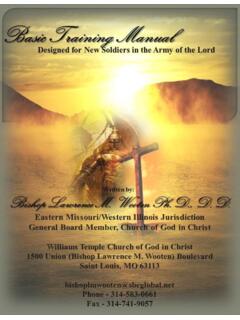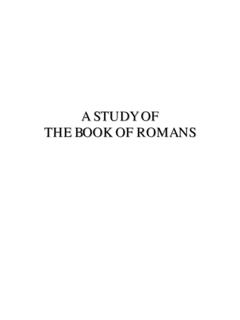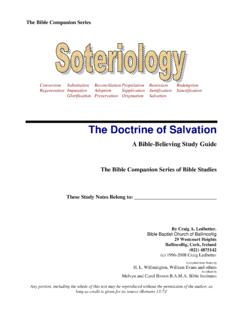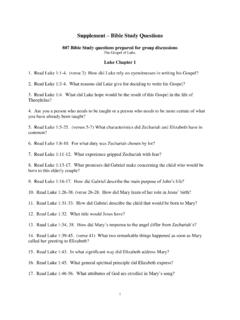Transcription of A VERSE BY VERSE STUDY GUIDE for the BOOK of Proverbs
1 1 A VERSE BY VERSE STUDY GUIDE for the book of Proverbs Prepared by Pastor David Braden 2 Copyright January, 2012 by David S. Braden. This data file is the sole property of David S. Braden. It may be copied only in its entirety for circulation freely without charge. All copies of this data file must contain this copyright notice. This data file may not be copied in part, edited, revised, copied for resale or incorporated in any commercial publications, recordings, broadcasts, performances, displays or other products offered for sale, without the written permission of David S.
2 Braden. Requests for permission should be made in writing and addressed to Pastor David S. Braden Unless otherwise noted, Scripture taken from the New King James Version, Copyright 1982 by Thomas Nelson, Inc. Used by permission. All rights reserved. Cover image used with permission of 3 Table of Contents Page Introduction to the STUDY 4 An introduction to the book of Proverbs 5 Chapter 1 15 The fear of the Lord a short STUDY 20 Chapters 1& 2 Summaries 24 Chapter 3 27 Chapter 4 31 Chapter 5 35 Chapter 6 40 Chapter 7 46 Chapter 8 50 Chapter 9 56 The Women of Proverbs (from ch-9)
3 60 Chapter 10 61 Chapter 11 69 Chapter 12 74 Chapter 13 80 Chapter 14 88 Chapter 15 93 Chapter 16 99 Chapter 17 106 Chapter 18 115 Chapter 19 121 Chapter 20 128 Chapter 21 136 Chapter 22 143 Chapter 23 148 Chapter 24 153 Chapter 25 159 Chapter 26 165 Chapter 27 169 Chapter 28 173 Chapter 29 180 Chapter 30 185 Chapter 31 189 4 Introduction to the STUDY This booklet is provided as a GUIDE to assist the new Christian and those who have never studied the book of Proverbs on a VERSE -by- VERSE basis.
4 In general, I have tried to identify the clustering of Proverbs (by topic) where appropriate. For each chapter, I have provided some word STUDY helps and, when applicable, identified text problems within the Hebrew. In many cases, I ve summarized what I believe is the principle teaching of a VERSE or cluster. I have also prayed continually for guidance as to how to present this STUDY and believe that God has given me help along the way. I have found that the use of charts and also quizzing those in my STUDY group as to what they know before we begin a chapter STUDY are useful STUDY techniques.
5 We also discovered that reviewing one chapter each week was a good pace and allowed us enough time to examine each VERSE . Just as God gave us the book of Psalms and its prayers for all occasions, I believe God gave us the book of Proverbs with its representative wisdom for all occasions. May this booklet be of use to you as you learn to be wise, walking in the fear of the Lord. 5 AN INTRODUCTION TO THE book OF Proverbs Outline: I. An Overview of Wisdom Literature II. A Quick Look at the book of Proverbs III.
6 Proverbs : Walking in the Fear of the Lord IV. Analyzing a Proverb with Examples I. An Overview of Wisdom Literature: Biblical wisdom literature provides principles for daily living for the community of God. These principles, given by a loving God, reveal God s will for our lives and show us how to live successfully and harmoniously while here on earth. In the wisdom books, God reveals patterns for living that: o help us gain an understanding of our own life, o help us as we relate to and work with others, and ultimately o learn about God Himself.
7 These books give instructions for the three primary activities of our daily lives: thought, speech and action. They teach us that the life we lead and the choices we make directly influence the quality of life that we will experience. We learn that we are where we are today because of choices that we have made in the past. These books provide us a rich treasury of human experiences that reveal the wisdom and grace of God. A Comparison of the Wisdom Books with other OT books: Books Central focus Application The Law Revelation and Guidance A historical record of God s revelations to man and legislation for the community of Israel Prophets Authority to speak for God God gives messages to mankind for the present and future.
8 Psalms Worship Simultaneously, a songbook and a prayer book Proverbs Wisdom; observation and reflections on personal experience A GUIDE for practical living Job A test; questions and reasonings Answers from God and man Ecclesiastes Vanity, the meaning of life We are shown the futility of pursuing a life style without God. Without God, life 6 is meaningless, fleeting. Three responses (inward motivations) regarding sin and righteousness: Subject Prophet Priest Wise Man Sin It is disobedience. It is defilement.
9 It is folly. Righteousness It is just. It is commanded. It is wise/prudent. There are three principle types of poetry in the OT: lyric, didactic and dramatic. 1. Lyric poetry is so-called because it was poetry originally accompanied by music played on the lyre. ( Psalms) 2. Didactic (teaching) In this type of poetry ( Proverbs and Ecclesiastes), observations and conclusions about life are shared. (An early teaching document of the NT church was called the Didache. ) 3. Dramatic poetry employs the use of conversation or dialogue to convey the message being presented.
10 The book of Job is Hebrew drama. In the ancient culture of Israel, Proverbs were used as a method of instruction for children. The wisdom literature of Israel consisted of writings produced by Israel s wise men. Wise men were one of 3 groupings of OT religious leaders, the other 2 being prophets and priests. There were four main characteristics of the wise men of the ancient cultures: 1. They carefully observed the human condition. 2. They were most often teachers. 3. They each had a particular method of discourse.

